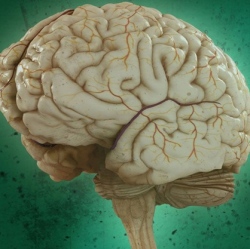
Electrical arrays implanted in the brain show promise in their ability to improve patients’ scores on memory tests, raising hopes for individuals suffering from memory deficits. The preliminary findings, from DARPA’s Restoring Active Memory (RAM) program, were presented in St. Louis.
Just over one year into the effort, the novel approach to facilitating memory formation and recall has already been tested in a few dozen human volunteers, said program manager Justin Sanchez. The subjects in the study have neurological problems unrelated to memory loss, but volunteered to test the new neurotechnological interventions while they were undergoing brain surgery.
In the study, small electrode arrays are placed in brain regions known to be involved in the formation of declarative memory, the relatively simple sort of memory used, for example, to recall lists of objects, as well as in regions involved in spatial memory and navigation.
The study aims to give researchers the ability to “read” the neural processes involved in memory formation and retrieval, and even predict when a volunteer is about to make an error in recall. The implanted electrodes also provide a means of sending signals to specific groups of neurons, with the goal of influencing the accuracy of recall.
Traumatic brain injury (TBI) is a serious cause of disability in the United States. Diagnosed in more than 270,000 military servicemembers since 2000 and affecting an estimated 1.7 million U.S. civilians each year. TBI frequently results in an impaired ability to retrieve memories formed prior to injury and a reduced capacity to form or retain new memories following injury.
Despite the scale of the problem, few effective therapies currently exist to mitigate the long-term consequences of TBI on memory. Through the Restoring Active Memory (RAM) program, DARPA seeks to accelerate the development of technology able to address this public health challenge and help servicemembers and others overcome memory deficits by developing new neuroprosthetics to bridge gaps in the injured brain.
